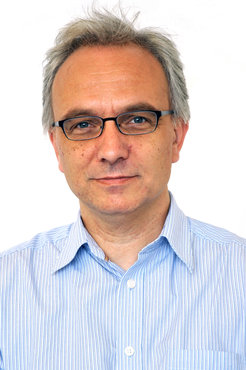The Alumni Interview: 10 Questions for Peter Finke

1. When were you at the MPI and what did you work on while you were here?
I was a member of the Department ‘Integration and Conflict’ from 2000 to 2006, first as a post-doc and later as a research group leader.
2. Where do you work now?
Since 2006 I am Professor at the Department of Social Anthropology and Cultural Studies at the University of Zurich.
3. How did the time you spent at the MPI shape your current career?
Without the time spent at the MPI I would probably not be a professor now. Being a research group leader at a Max Planck Institute is an excellent qualification for one’s future scholarly career. At the same time, the fact that I was able to gain teaching experience as a guest professor at the University of New Hampshire and the Middle East Technical University in Ankara certainly also played a large part in my appointment to a professorship.
4. When you think back on your time at the MPI, what stands out most strongly?
The great freedom in pursuing my research, the fascinating workshops and conferences, the intense communication with colleagues from around the world – all of these things created a truly unique atmosphere. And of course the excellent support provided by the service departments played no small part in this. Such helpful and capable management and library staff are worth their weight in gold.
5. Do you still have connections with the MPI, and if so, what kind of contact and with whom?
Together with Günther Schlee I am a supervisor for a number of doctoral candidates. As a result, but also for other reasons, I visit the institute two or three times a year. And I am in regular contact with friends and former colleagues from my time at the institute, and of course with the members of the CASCA group (Centre for Anthropological Studies on Central Asia).
6. What is your current research topic?
At present I am working on three projects. The first one is a long-term study of nomads in Mongolia, which I have been engaged in since my dissertation. A monograph with my research results is forthcoming. Second, I, along with four doctoral students in Halle and Zurich, have a project in southeast Kazakstan that investigates the effects of the economic boom happening there. We are interested in examining who profits from these developments and who does not, and also in determining what processes of social and cultural change they are triggering. The third project is concerned with Kazaks from Mongolia who have resettled in Kazakstan as part of a repatriation programme and the difficult conditions they frequently face there.
7. What are your plans for the future?
The project on southeast Kazakhstan is conceived of as a long-term study and it will surely continue to keep me busy for some time to come.
8. Why did you become an anthropologist?
I initially studied Turkology. But the focus on textual material left me feeling like something was missing. I didn’t want to just do philological work; I wanted to talk to people! And then, after I visited Mongolia for the first time in 1991, I resolved to become an anthropologist. But my enthusiasm for Central Asia started much earlier and goes back to my childhood.
9. What advice would you give to students studying social anthropology today?
I would advise them to engage in their studies more efficiently and purposefully than I did. It is also a good idea to spend an extended period of time abroad as early as possible. For an academic career it is essential to be able to demonstrate experience working in countries outside Europe. At any rate, candidate selection processes at present all still put varying degrees of emphasis on this.
10. What text – whether a book or article – have you read recently that particularly impressed you?
Well, naturally there are a lot of texts that come to mind. But I can recommend – not entirely without some personal pride – a number of the dissertations that I supervised over the past few years.
If I have to choose one:
Stefan Leins, Stories of Capitalism: Inside the Role of Financial Analysts (University of Chicago Press)
Or else (by a former MPI researcher):
Esther Horat, Trading in Uncertainty: Entrepreneurship, Morality and Trust in a Vietnamese Textile-Handling Village (Palgrave)
There are additional studies, but the manuscripts are still being prepared for publication in book form.
